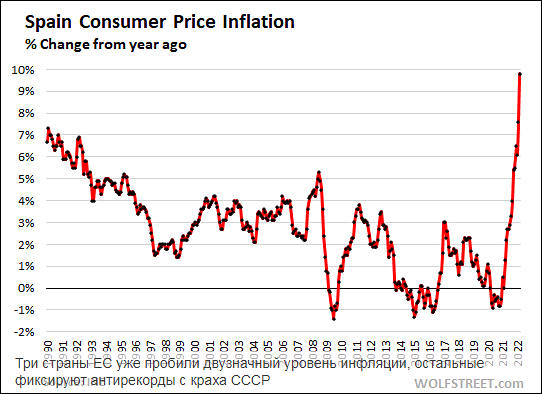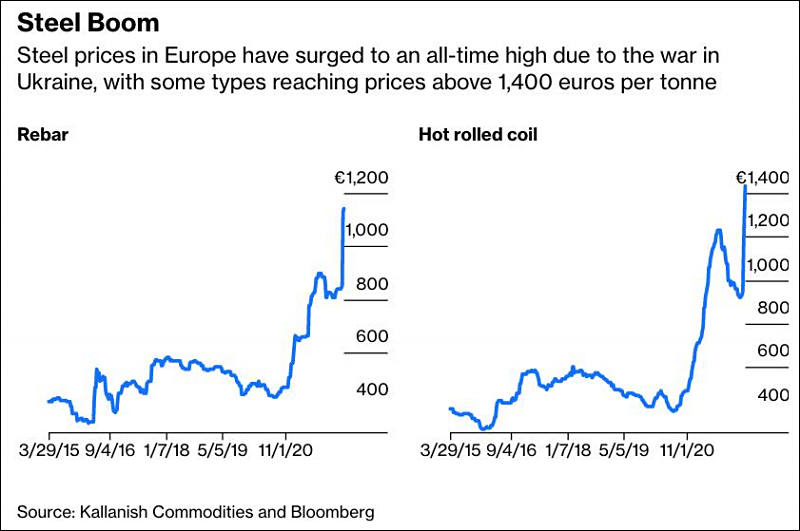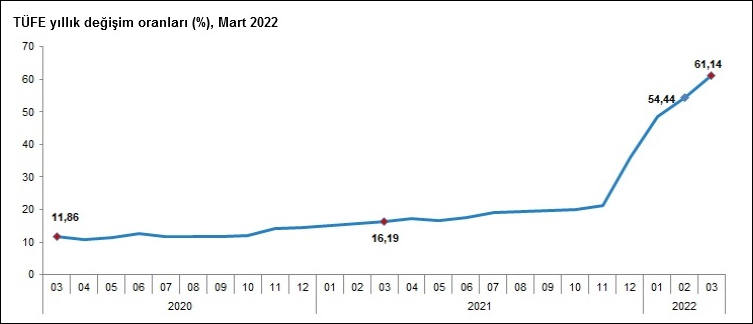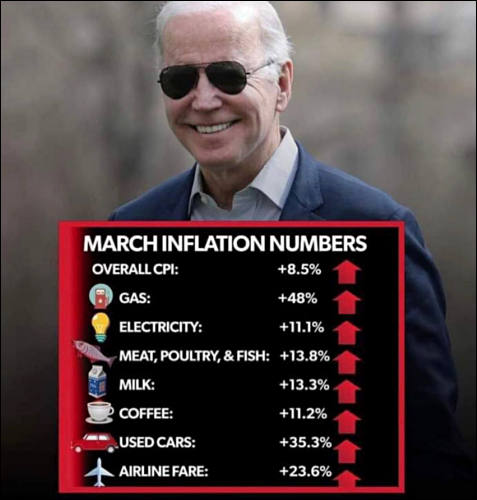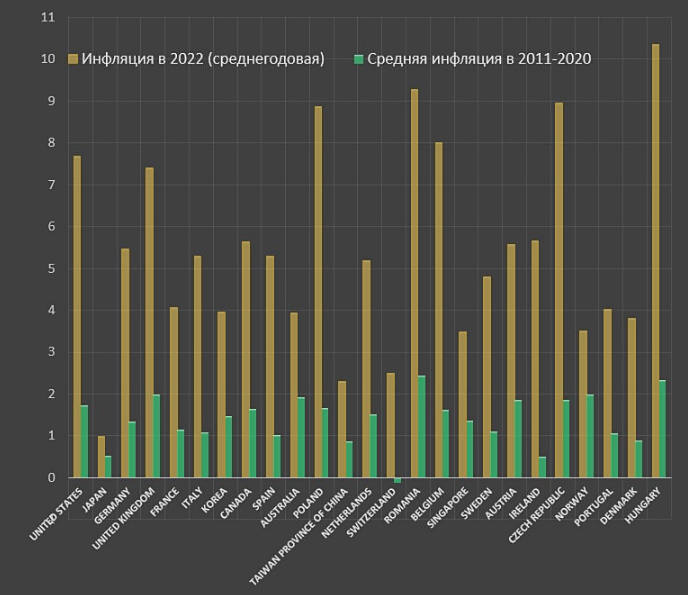
It allows to keep PV going, with more focus towards AI, but keeping be one of the few truly independent places.
-
Economists with Bloomberg are warning that the average American should budget an extra $5,200 this year for higher prices – or an extra $433 every month.
Economists Andrew Husby and Anna Wong write that households can expect to pay thousands more in 2022 for the same basket of goods and services they used last year.
-
In March, for the first time in this century, inflation in Poland exceeded 10 percent. It accelerated to 10.9 percent. year on year from 8.5 percent in February. This is the effect of the sharp rise in fuel prices as well as food prices.
According to the Central Statistical Office (GUS), the consumer price index (CPI), the main indicator of inflation in Poland, rose by 10.9 percent in March. year on year, after an increase of 8.5 percent. in February and 9.4 percent. in January. Economists polled by Parkiet calculated that the average CPI increased by 10.1 percent. Only four of the 23 think tanks that participated in this survey expected inflation to exceed 10.5 percent.
-
South Korea recorded more than a 30% jump in prices for imported agricultural, livestock and fish products in a year, which led to an overall increase in consumer prices in the country as world demand returned to normal, data from the Korea Institute for the Promotion of Trade Statistics showed.
According to the research institute, the import price index for agricultural, livestock and fish products in February reached 112.6, up 31.7% from a year earlier. The index is calculated on the basis of the axiom that in 2015 prices were at the level of 100. As a result, year-on-year prices for imported agricultural products have been rising for the third month in a row. In December by 33.5%, in January by 31.5%, in February by 33.3% compared to the same period last year.
According to the Korea Herald, among cereals, prices for imported green beans rose by 68.1%, milling wheat by 58.4%, fodder corn by 52.4% and processing corn by by 42.3%. It is noted that the prices of wheat and corn directly affect consumer prices in general, since these crops are used as raw materials for various food products. Also, compared to February 2021, prices for fruits and a number of vegetables also increased. Prices for imported beef rose by 47-53%, chicken - by 47.5%, and pork - by 6.4%. Prices for fish products increased by 13.5%, for live fish - by 38.6%, for fresh fish - by 30%, and for frozen fish - by 8.8%.
-
World prices for basic food commodities reached their highest levels ever as a result of the impact of the conflict in Ukraine on the markets for essential grains and vegetable oils. This is evidenced by the Food and Agriculture Organization of the United Nations (FAO) Food Price Index released on Friday, which reflects monthly changes in international prices for basic foodstuffs.
The FAO Food Price Index averaged 159.3 in March, up 12.6% from February, when it already reached its highest level since its introduction in 1990. As noted, last month the previous anti-record recorded in 2011 was overcome.
This trend, according to FAO experts, is due to a significant increase in prices for wheat and all feed grains, mainly due to the conflict in Ukraine. "In the past three years, the Russian Federation and Ukraine accounted for about 30% of world wheat exports and 20% of world corn exports. World wheat prices soared by 19.7% during the month," the FAO said in a statement. As specified, fears about the state of crops in the United States also contributed to the rise in prices. "Maize prices rose by 19.1% in a month, reaching a record level, and, in addition, the increase in prices affected barley and sorghum," FAO states.
The FAO Vegetable Oil Price Index rose 23.2% as a result of higher prices for sunflower oil, of which Ukraine is the world's leading exporter. Palm, soybean and rapeseed oil prices also increased markedly as a result of higher sunflower oil and crude oil prices. Rising oil prices, along with an appreciation of the Brazilian real exchange rate, led to an increase in the average value of the sugar price index (up 6.7% compared to February), offsetting the previous decline. As a result, it turned out to be 20% higher than in March 2021.
-
Inflation in Denmark reached a 37-year high and rose from 2% to 5.4%, writes Bloomberg. The country's existing problems with a shortage of labor were also superimposed by an increase in energy prices. Inflation in the UK from February 6% is preparing for 8%. The average UK household will pay 73% more on their bills than last year. The standard of living will fall to the levels of 1950.
In the Czech Republic, due to the increase in the price of gasoline (+50%), electricity (+24.7%) and gas (+37.7%), record inflation was recorded - 12.7%. The last time this figure was in 1998. Germany also did not stand aside - inflation in March amounted to 7.3% - the highest rate in the last 40 years.
-
March inflation in the US reached 8.5%. This is the highest figure in 40 years.
-
In the UK, furniture has risen in price by 17% over the past month due to a ban on wood imports from Russia and Belarus
The cost of one sofa has increased by a quarter. In some cases, tables and cabinets have doubled in price, British manufacturers say. The cost of furniture is affected by the lack of wood, inflation (7%), rising prices for electricity and fuel.
Furniture manufacturers have discovered a rise in prices when buying wood - birch, beech and other key materials have risen in price by 25%. Purchases were made mainly from Eastern Europe. If prices prove unaffordable for buyers, the state budget risks losing large sums: furniture production in the UK brings the economy £ 13 billion a year. In addition, when timber becomes more expensive in the country, prices for repairs and construction soar. So you can prepare for such news in the near future.
And this is due to the fact that the Russian Ministry of Industry and Trade in March banned exports from Russia to "unfriendly countries", which included the UK. The restriction will remain in effect until the end of 2022.
-
Producer prices (PPI index) in Germany soared by 30.9% in March compared to the same month last year, according to data from the German Federal Statistical Office (Destatis). This is the highest increase on record since 1949. In February, an increase of 25.9% was recorded, in January - by 25%. The pace of recovery has been breaking records for four months in a row.
Analysts on average predicted a rise in the PPI index by 30% in March.
Energy prices jumped last month by 83.8%, including natural gas rose by 144.8%. In addition, the cost of metals increased (by 39.7%), including steel and steel alloys (by 55%) and aluminum (by 57.1%).
Food prices rose by 12.2% and cars became more expensive by 3.8%.
-
"In March 2022, the industrial producer price index, which reflects changes in producer prices of industrial goods produced in Estonia for the domestic market and for export, increased by 3.0% compared to February 2022 and by 30.3% compared to March 2021.
Eveli Shokman, a leading analyst at Statistics Estonia, said that compared to March last year, the index was primarily affected by rising prices for electricity and heat production, as well as for the production of wood and wood products, finished metal products and food products. “In manufacturing as a whole, prices rose by 20.3%, while in food production prices rose by 16.3%,” Shokman added.
Compared to February, the producer price index was primarily affected by higher prices in the production of fuel oil, in the production of wood and wood products, in the production of electricity and in the production of food products.
In March, compared with February, the export price index increased by 2.8%. The greatest growth occurred in prices for electricity, oil products and agricultural products. Compared to March 2021, the export price index increased by 23.5%.
-
UK manufacturers are raising prices at the fastest pace since 1979 - but the fall in investment sentiment seems to be happening faster
87% of firms reported price pressure on them. Entrepreneurs are trying to cover the rising cost of raw materials and energy, expecting further acceleration for at least another three months. In addition, due to the Ukrainian crisis, problems with the supply of raw materials for production are also aggravated.
Confidence in the future among British factories fell below 40-year levels. A survey among manufacturers showed a drop in investment sentiment lower than during the coronavirus crisis, according to the Daily Mail. The Confederation of British Industry said its quarterly confidence score among manufacturing companies has fallen from 9% to 34% since January.
-
Annual inflation in Lithuania reached a maximum in 25 years: in April it amounted to 16.6% compared to 15.7% a month earlier
-
April inflation in Germany broke a 40-year record, reaching 7.4% per annum. In March it was 7.3%.
-
German farmers are open about possible food shortages due to fertilizer shortages. “At some point, the question is no longer how much the raw materials for our food cost on the world market, but whether we will get it at all,” said Christian von Boetticher, president of the German Federal Food Industries Association. He called on Minister of Agriculture Cem Özdemir to switch from the Green program to active crisis management.
"In terms of rising food prices, and with 50 million starving all over the world, no one can explain why German farmers should in the future just "organically" cultivate 20% of the cultivated area and even close 10% to organic pastures," Boetticher said. .
Daniel Schneider, CEO of the Central Association of the German Bakery, said that rising costs for electricity, raw materials and personnel have particularly affected the food industry. Bakery production costs have risen by 25-30%, but food "shouldn't be a luxury," Schneider explains.
This is not just a figure of speech from Schneider about the poor, amid rising energy prices, announcing the introduction of food stamps, French President Emmanuel Macron stressed that this is a way to support the purchasing power of not only disadvantaged families, but also the middle class.
Overseas, Gregory Meeks, chairman of the U.S. House of Representatives Committee on Foreign Affairs, said on MSNBC: "People will starve. We're talking about it here at home. Prices are going up and inflation. There's a direct link - if you talk to any economist, a direct link between Putin, this war and these blockades that could lead to people starving in Africa, Central and South America, and even right here in the United States of America.”
Goya Foods CEO Bob Unanyu warned on Fox Business that "We are on the brink of a global food crisis" and while food is plentiful in the US, "Americans will have to tighten their belts and consume less."
Howdy, Stranger!
It looks like you're new here. If you want to get involved, click one of these buttons!
Categories
- Topics List24,002
- Blog5,724
- General and News1,368
- Hacks and Patches1,153
- ↳ Top Settings33
- ↳ Beginners255
- ↳ Archives402
- ↳ Hacks News and Development56
- Cameras2,365
- ↳ Panasonic990
- ↳ Canon118
- ↳ Sony155
- ↳ Nikon96
- ↳ Pentax and Samsung70
- ↳ Olympus and Fujifilm100
- ↳ Compacts and Camcorders299
- ↳ Smartphones for video97
- ↳ Pro Video Cameras191
- ↳ BlackMagic and other raw cameras123
- Skill1,961
- ↳ Business and distribution66
- ↳ Preparation, scripts and legal38
- ↳ Art149
- ↳ Import, Convert, Exporting291
- ↳ Editors191
- ↳ Effects and stunts115
- ↳ Color grading197
- ↳ Sound and Music280
- ↳ Lighting96
- ↳ Software and storage tips267
- Gear5,414
- ↳ Filters, Adapters, Matte boxes344
- ↳ Lenses1,579
- ↳ Follow focus and gears93
- ↳ Sound498
- ↳ Lighting gear314
- ↳ Camera movement230
- ↳ Gimbals and copters302
- ↳ Rigs and related stuff272
- ↳ Power solutions83
- ↳ Monitors and viewfinders339
- ↳ Tripods and fluid heads139
- ↳ Storage286
- ↳ Computers and studio gear560
- ↳ VR and 3D248
- Showcase1,859
- Marketplace2,834
- Offtopic1,324


